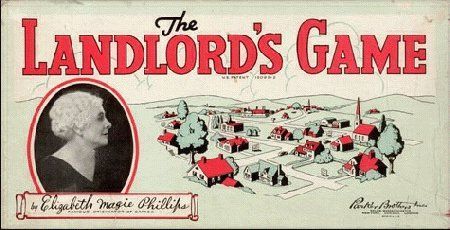The Landlord’s Game (1903) Board Game
The Landlord’s Game is a board game that was originally created by Elizabeth J. Magie in in 1903. It was designed to illustrate the economic consequences of land monopolism and the concept of Georgism. The game was later patented in 1904 and marketed by the Economic Game Company. It eventually became the inspiration for the popular game Monopoly.
Game Components of The Landlord’s Game
How To Setup The Landlord’s Game
To set up the game, players need to distribute the money and Chance cards. The game board is laid out with each player choosing a token. The game can be played with either the anti-monopolist or monopolist rules, depending on the players’ preferences. In the anti-monopolist version, players can vote to enact single tax rules, which redirect revenue that would go to private pockets into the public treasury.
Gameplay Mechanics and Game Objective
Player Experience
The Landlord’s Game offers a unique educational experience, particularly for those interested in economics and social justice. Players are immersed in a simulation that highlights the consequences of monopolistic practices and the benefits of a single tax system. The game was popular among left-wing intellectuals and college students, who often created their own versions using Magie’s rules.
Pros
Cons
Personal Thoughts on The Landlord’s Game
The Landlord’s Game is ideal for those with an interest in economics, history, and social justice. It offers a unique blend of education and entertainment, making it a compelling choice for academics, historians, and anyone looking for a game with depth and historical significance. While it may not be as widely recognized or accessible as Monopoly, it provides a fascinating glimpse into the origins of modern board games and the economic theories that shaped them.
We are supported by our audience. When you purchase through links on our site, we may earn an affiliate commission, at no extra cost for you. Learn more.

